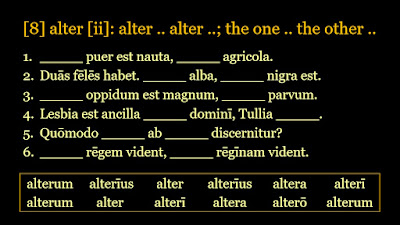Two boys were playing the street. One [of them] was kicking a ball.
There’s nothing
unusual about that second sentence if the speaker is only focussing on one boy.
However, if he is focussing on both of them …
One [of them] was kicking a ball, the other
riding his bike.
When referring to
two people / things and expressing, for example, what one person was doing as
opposed to what the other person was doing, Latin uses alter … alter
…
Cīvēs [i] alterīus
cōnsulis verbīs sunt territī, [ii] alterīus factīs. Neutrī
pārēbant. │ The citizens were terrified by the words of [i]
the one consul and terrified by the deeds of [ii] the other. They
were obeying neither.
Caesar et
Orgetorix prīncipēs fuērunt; alter necātus (est), alter ob
victōriam laudātus est │ Caesar and Orgetorix were leaders; one was
killed, the other praised on account of the victory.
Alter lēgātus hostēs moenibus prohibēre, alter
incolās convocāre coepit │ One commander began keeping the enemy
from the walls, the other (began) summoning the citizens.
Cum Caesar in
Galliam vēnit, alterīus factiōnis prīncipēs erant Aeduī, alterīus
Sēquanī. │ When Caesar came to Gaul, the leaders of one faction were the
Aedui, (0f) the other were the Sequani.
impōnit geminum alterum
in nāvem pater … illum relīquit alterum
apud mātrem domī (Plautus)│ The father
put one twin in the ship … that other one he left at home with
the mother.
Diūtius cum
sustinēre nostrōrum impetūs nōn possent, alterī sē, ut coeperant, in
montem recēpērunt, alterī ad impedīmenta et carrōs suōs sē contulērunt
(Caesar) │ When they could no longer withstand the attacks of our men, the one
division [= one group of men; nominative plural], as they had begun to
do, betook themselves to the mountain; the other [ = group of men; the
others] repaired to their baggage and wagons.
Factum est ut
inimīcī alter ¦ alterī auxiliō essent. │ It happened that the (two)
enemies were of help to one another [ = one ¦ to the other].
bellum illud quod
cīvēs nostrī alterī ¦ cum alterīs ¦ gessērunt │ that war which our
citizens waged with one another [ = ones (i.e. one group of the
citizens) ¦ with the others (the other group)
Exercise: Complete the Latin
sentences with the appropriate forms of alter; in most of the sentences,
the gender and case of alter is the same for both, but pay close
attention to sentence [5]
[1] One boy is a
sailor, the other a farmer. │ _____
puer est nauta, _____ agricola.
[2] He has two
cats. One is white, the other black. │ Duās fēlēs habet. _____ alba, _____
nigra est.
[3] One town is
big, the other small. │ _____ oppidum est magnum, _____ parvum.
[4] Lesbia is the
maidservant of the one master (one of the two masters), Tullia (the
maidservant) of the other. │ Lesbia est ancilla _____ dominī, Tullia _____.
[5] How is one
(thing) distinguished from the other? │ Quōmodo _____ ab _____ discernitur?
[6] Some (i.e. one group of people) see the king, the others the queen. │ _____ rēgem vident, _____ rēgīnam vident.
alterum; alterum; alterum; alterō; alterīus; alterīus; alterī; alterī; altera; altera; alter; alter
____________________
[1] Alter puer est nauta, alter agricola.
[2] Duae fēlēs habet. Altera
alba, altera nigra est.
[3] Alterum oppidum est magnum, alterum parvum.
[4] Lesbia est ancilla
alterīus dominī, Tulliā alterīus.
[5] Quōmodo alterum
ab alterō discernitur?
[6] Alterī rēgem vident, alterī rēgīnam vident.

No comments:
Post a Comment